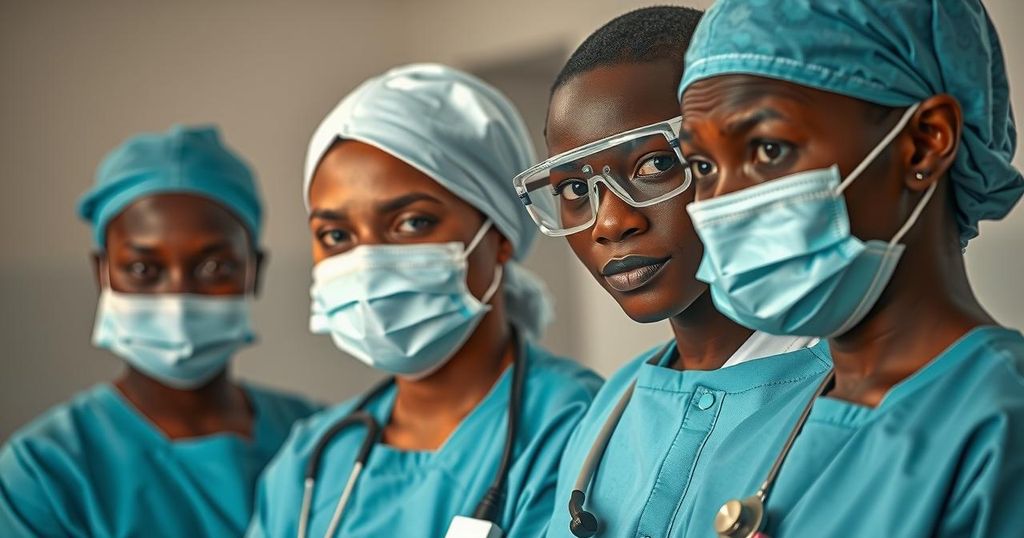Sudan’s healthcare system is crumbling under the weight of ongoing conflict between rival generals, with doctors like Mohamed Moussa performing life-saving work amid significant danger. Armed conflict has destroyed near half of Khartoum’s hospitals and left health workers vulnerable to attacks, while the looming threat of famine complicates the humanitarian crisis further.
In the war-torn landscape of Sudan, healthcare has plunged into chaos, with medical professionals like Dr. Mohamed Moussa enduring the daily horrors of conflict to care for their patients. Located in Al-Nao hospital in Omdurman, which remains one of the few operational medical facilities, Dr. Moussa has become desensitized to the sounds of gunfire and bombing nearby. He states that, despite the omnipresent danger, health workers are compelled to continue their efforts, saying, “The bombing has numbed us.”
Since April 2023, the violent struggle for power between army leader Abdel Fattah al-Burhan and his former deputy, Mohamed Hamdan Daglo, head of the paramilitary Rapid Support Forces, has deteriorated the country into a humanitarian disaster. With tens of thousands dead and 12 million displaced, the International Rescue Committee has labeled this crisis as the worst on record. Hospitals have become battlegrounds, and Al-Nao hospital is indicative of the broader catastrophe as health workers grapple with severe wounds, including gunshots and severe burns, impacting even young children.
The toll on healthcare is immense, with evidence confirming that nearly half of the hospitals in Khartoum state sustained damage since the onset of the war. Reports indicate 119 verified attacks on healthcare facilities across Sudan, showcasing a blatant disregard for civilian safety. The doctors’ union reveals that up to 90% of medical facilities in conflict zones have been compelled to close, denying millions essential care.
In addition, both military factions are implicated in the targeting of medical staff and facilities, leading to a climate of fear for health workers. The ongoing conflict has not only resulted in battle casualties but has simultaneously propelled a looming famine, threatening the lives of millions. Dr. Moussa underscores the challenge they face, stating, “But we cannot stop; we owe it to the people who depend on us.”
Amidst the chaos, health organizations like the International Committee of the Red Cross stress the urgent need for humanitarian assistance to avert a complete collapse of medical services as the crisis exacerbates.
The ongoing conflict in Sudan, particularly marked since April 2023, arises from a power struggle between army leaders Abdel Fattah al-Burhan and Mohamed Hamdan Daglo. This civil strife has had cataclysmic effects on the civilian population, driving millions from their homes and leading to unprecedented humanitarian crises. The healthcare system, already fragile prior to the conflict, is now facing catastrophic setbacks, with healthcare workers risking their lives to provide care amid rampant violence and infrastructural damage. Meanwhile, widespread starvation looms as food becomes increasingly scarce, compounding the dire medical needs of the population.
The conflict in Sudan has emerged as one of the most severe humanitarian crises, leaving healthcare professionals overwhelmed and under siege as they bravely continue their work against the backdrop of war. With a dramatic increase in violence against health workers and facilities, and millions facing acute hunger, there is an urgent call for humanitarian aid to support the faltering healthcare system. The resilience displayed by doctors like Dr. Moussa highlights both the deep commitment to their patients and the critical challenges that lie ahead.
Original Source: www.barrons.com






